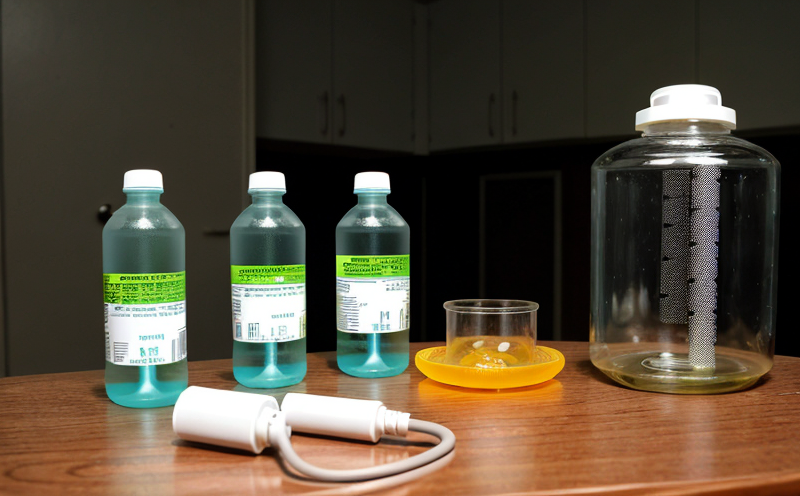EPA 926 Plutonium 239 Determination Test in Water
The EPA Method 926 is designed to determine plutonium-239 (Pu-239) concentrations in water samples. This method plays a crucial role in environmental monitoring, especially for facilities that handle nuclear materials or waste. The test ensures compliance with regulatory standards set by the Environmental Protection Agency and other relevant authorities.
This methodology involves several critical steps to ensure accurate results. Initially, the sample is prepared using techniques such as dilution or concentration depending on the initial Pu-239 concentration. This step ensures that the sample falls within the detection limits of the analytical methods used in this test. A significant challenge here is maintaining the integrity of the sample throughout the preparation process to avoid contamination or degradation.
The actual measurement involves a combination of techniques including chemical separations, alpha spectrometry, and gamma spectroscopy. The purpose of these steps is to isolate Pu-239 from other radionuclides present in the water matrix. This isolation is achieved through specific chemical reagents that selectively bind with Pu-239 while leaving other elements unaffected.
The process also includes quality assurance checks at every stage, such as using certified reference materials (CRMs) and performing blank tests to account for any potential contamination. The detection limits of this method are around 0.1 ng/L, making it highly sensitive even in low concentration environments.
Understanding the implications of Pu-239 levels is essential from a public health perspective as well as environmental conservation. High levels of plutonium can pose significant risks if ingested or inhaled. Therefore, regular monitoring and adherence to regulatory standards are paramount for minimizing these risks.
The significance of this test extends beyond just compliance with regulations; it also contributes to scientific research aimed at better understanding the behavior of radioactive materials in aquatic environments. This knowledge is vital for developing more effective remediation strategies and ensuring long-term safety.
Given its importance, laboratories performing this test must have stringent quality assurance protocols and experienced personnel trained specifically on this methodology. Compliance with international standards such as ISO/IEC 17025 further reinforces the reliability of these tests.
In conclusion, EPA Method 926 is a robust tool for determining Pu-239 in water samples. Its precision and accuracy make it indispensable for ensuring environmental safety and regulatory compliance. Understanding its intricacies can help stakeholders make informed decisions regarding nuclear waste management and protection against radiation hazards.
Benefits
The EPA 926 Plutonium-239 Determination Test in Water offers several key advantages:
- Compliance Assurance: Ensures adherence to stringent environmental regulations set by the EPA and other governing bodies.
- Precision: Achieves high precision with detection limits as low as 0.1 ng/L, providing reliable data for decision-making.
- Safety: Minimizes health risks associated with plutonium exposure through regular monitoring and compliance checks.
- Research Support: Contributes valuable information to ongoing research efforts focused on nuclear waste management and environmental science.
- Confidence in Data: Results are derived from a rigorous process that includes multiple quality assurance steps, enhancing trustworthiness.
- Enhanced Reputation: Demonstrates commitment to excellence in analytical services, which can bolster an organization's reputation among stakeholders.
In summary, this test not only supports regulatory compliance but also plays a pivotal role in safeguarding public health and the environment. By leveraging this method, organizations can ensure they are meeting all necessary standards while contributing positively to scientific advancement.
Eurolab Advantages
At Eurolab, we pride ourselves on delivering unparalleled quality and reliability in our testing services. Our expertise in the EPA 926 Plutonium-239 Determination Test is complemented by state-of-the-art facilities equipped with cutting-edge technology. Here’s why choosing us for this service is advantageous:
- ISO/IEC 17025 Compliance: Our laboratory adheres to the highest international standards, ensuring that every test result is accurate and reliable.
- Experienced Staff: Our team consists of highly skilled professionals trained specifically in this methodology, guaranteeing consistent high-quality results.
- Advanced Equipment: Utilizing modern instrumentation such as advanced spectrometers ensures precise measurements even at very low concentrations.
- Comprehensive Support Services: We offer not only testing but also consultation services to help clients understand their data better and implement necessary changes based on our findings.
- Quick Turnaround Times: Efficient workflows allow us to provide timely results without compromising accuracy, which is crucial for compliance purposes.
- Custom Solutions: Tailored approaches to meet the unique needs of each client, whether it’s a one-off test or ongoing monitoring programs.
In essence, Eurolab provides more than just testing; we offer comprehensive support tailored to your specific requirements. Whether you need occasional assistance or long-term partnership, our services are designed to exceed expectations and deliver value-added solutions.
Quality and Reliability Assurance
The quality and reliability of the EPA 926 Plutonium-239 Determination Test in Water at Eurolab are ensured through a robust quality management system that adheres strictly to ISO/IEC 17025 standards. Here’s how we maintain these high standards:
- Accreditation and Certification: Our laboratory is accredited by leading bodies worldwide, ensuring our methods meet the highest international standards.
- Certified Reference Materials (CRMs): We use certified reference materials throughout our testing process to calibrate instruments accurately and validate results consistently.
- Blank and Spike Tests: Conducting both blank and spike tests helps us identify any sources of contamination or inaccuracies, thereby enhancing the reliability of our findings.
- Duplication Checks: Each sample is analyzed multiple times to cross-verify results, ensuring consistency across different analyses.
- Data Integrity Protocols: Strict protocols are in place to secure data integrity and prevent unauthorized access or manipulation.
- Ongoing Training: Continuous training for our staff ensures they stay updated with the latest techniques and methodologies, maintaining proficiency in their respective fields.
- Precision Instruments: Our laboratory is equipped with precision instruments that provide accurate measurements down to extremely low levels of detection.
In summary, Eurolab takes a multi-faceted approach to quality assurance, combining rigorous internal procedures with external accreditations and certifications. This commitment ensures that every test conducted here meets the stringent requirements needed for regulatory compliance and scientific accuracy.





